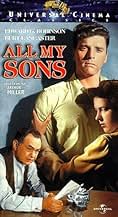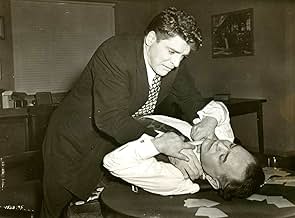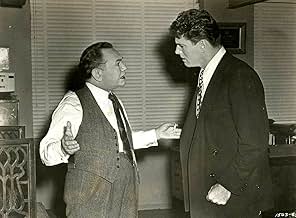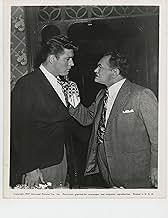Durante la Segunda Guerra Mundial, Joe Keller comete un delito e inculpa a su socio Herbert Deever, pero años más tarde su pecado vuelve a por él cuando descubre que su hijo planea casarse c... Leer todoDurante la Segunda Guerra Mundial, Joe Keller comete un delito e inculpa a su socio Herbert Deever, pero años más tarde su pecado vuelve a por él cuando descubre que su hijo planea casarse con la hija de Deever.Durante la Segunda Guerra Mundial, Joe Keller comete un delito e inculpa a su socio Herbert Deever, pero años más tarde su pecado vuelve a por él cuando descubre que su hijo planea casarse con la hija de Deever.
- Dirección
- Guionistas
- Elenco
- Premios
- 2 premios ganados y 2 nominaciones en total
- Frank Lubey
- (as Henry Morgan)
- Townswoman
- (sin créditos)
- Jorgenson
- (sin créditos)
- Mrs. Hamilton
- (sin créditos)
- Bartender
- (sin créditos)
- Workman
- (sin créditos)
- Judge
- (sin créditos)
- Halliday
- (sin créditos)
- McGraw
- (sin créditos)
- Dirección
- Guionistas
- Todo el elenco y el equipo
- Producción, taquilla y más en IMDbPro
Opiniones destacadas
Even starting with the opening credits, it feels like you're observing a family, not watching a movie. From the dawn of Tinseltown, credits preceded the film with music (or silence) and black and white titles. All My Sons was either the first or one of the first films to show footage behind the text instead. Immediately, you're immersed. When Burt Lancaster shares scenes with his girlfriend, Louisa Horton, you hear them whispering while in dim lighting. This is an entirely different type of drama. There aren't spotlights, strategically turned heads during important lines, and shouting to the back row.
If you like upsetting dramas, this might become a favorite of yours - especially if you're an Arthur Miller fan. Director Irving Reis got the best performances from his actors and brought what could have been a melodrama into a family's living room. It's a very good film, but it might be too heavy for the average viewer.
The production style and direction (for reasons of cost and utility) let the words of Miller's play take center stage. In beautiful black-and-white, the Art and Set direction are spare, firm, and commanding. They command our attention. Miller is big on attention to the issues his characters are grappling with and their impact on the significant issues of our (and all) time.
As Miller repeats in Death of a Salesman, there are layers of meaning and understanding between his characters and the issues they confront internally and externally. The two business partners have had a long, intimate family relationship (like Cain and Able). So close a connection that his son could have married his partner's daughter. And she, of course, is the only one who has always known (from that son) the truth about the son's death. And the fact (s) about the father.
Miller shows us that the father's Horatio Alger lies are at the foundation of who we are individually and collectively as Americans; the lies can almost thoroughly wash out what individuals and a community should think about its leading citizens. It is an interesting plot twist that, as Miller's script points out, the low-class birth and poverty of the father embed him into the fabric of the community.
That the film faithfully carried Miller's message of contempt and loathing not only for the worship of that false god(capitalism) but also for the whole Horatio Alger hero myth (that both American liberals and conservatives embrace) is quite daring. Even for a film world that had not yet descended into the long night of the "Black List."
Here the opening scenes are middle class and almost mundane and so post war. A son (Burt Lancaster) has returned from war and is planning to marry the girl of his dead brother, killed in the war. The living son's mother can't deal with the fact that her dead son is indeed dead - he died on an aerial mission and his body was never recovered. And thus she is not very supportive of this prospective union.
But this film turns out not to be about war and remembrance and the new middle class at all. Instead it is about a deed past done, and apparently the perpetrator has gotten away with it, and only as the film wears on are all of the secrets revealed, as well as the real reason the mother cannot accept her son's death.
Edward G. Robinson is terrific as the father who is living the American dream after being set out on the sidewalks by his own family since the age of ten. Lancaster with his beaming smile and his head full of bushy hair would look at home in a collegiate letter jacket, and this is a good early showcase for his talents. Harry Morgan appears in a minor role as one of the fathers of the ongoing baby boom.
I haven't said much here about what is really the conflict in this film, because I don't want to give anything away. However, it is a great film about moral conflict versus friend and family and even patriotic obligations, and it is a shame it is so obscure.
A terrific human guilt drama that reflects family pressure and a long-living conscience. Irving Reis's family drama is neither entertaining nor strained, but quite suspenseful. The idea of keeping the mystery unwrapped till the end was certainly new for family dramas back then, or is even today. Also, World War reference and the corporate business culture during the war period fit perfectly here. Joe Keller had been accused of murdering army officers due to a faulty shipment years ago. The court and juries acquitted him and grabbed his business partner, Herb. Now, years later, Herb's daughter and Joe's son want to get married, but Herb's son learns the truth and wants his sister to stay away from Joe and his family. The girl was previously engaged to Joe's first son, who disappeared years ago, and that's why the other son can't marry her as the mother is still hoping for that son to return home. What is the truth? Well, I guess you know it by now, or you can sense it halfway while watching the movie, but that doesn't kill the suspense at all. It eventually becomes more interesting because of its consequences. Things are predictable, but never boring. Every character offers something different. Every character has a problem of its own, and that's how they get involved with each other and then find a solution. The film has terrific speed, and the screenplay makes sure you don't get away from your sofa. The tension feels real and intriguing. Edward G. Robinson is fantastic as the man of the family, the man with the guilt, and the man with the responsibility. I couldn't have imagined him and Burt Lancaster playing father and son in the 40s, but it came out so well. Louisa Horton is another star performer, along with Mady Christians. I shall give full marks to Irving Reis for keeping me hooked and gripped for 95 minutes with the drama that I thought couldn't hold me. Reis makes sure the engagement gets an intellectual and burning ending, so don't miss it.
RATING - 7/10*
By - #samthebestest.
¿Sabías que…?
- TriviaThe original Broadway production of "All My Sons" opened at the Coronet Theater in New York on January 29, 1947. It ran for 328 performances, and won the 1947 Best Play Tony Award for author Arthur Miller. His original script was used as the basis for this movie's screenplay.
- ErroresWhen Joe comes out of the house upon Annie's arrival, he comes down the front steps and walks into the yard with his arms raised. In the next instant, he's back at the steps and his arms are down.
- Citas
Jim Bayliss: Put her to bed, Joe. Both of you go to bed. Staying up won't help; sleep will. Sleep's a wonderful thing, the best thing about living.
- ConexionesFeatured in Film Preview: Episode #1.1 (1966)
Selecciones populares
- How long is All My Sons?Con tecnología de Alexa
Detalles
- Fecha de lanzamiento
- País de origen
- Sitios oficiales
- Idioma
- También se conoce como
- All My Sons
- Locaciones de filmación
- Santa Rosa, California, Estados Unidos(the Grace home on McDonald Avenue)
- Productora
- Ver más créditos de la compañía en IMDbPro
- Tiempo de ejecución
- 1h 34min(94 min)
- Color
- Relación de aspecto
- 1.37 : 1






















